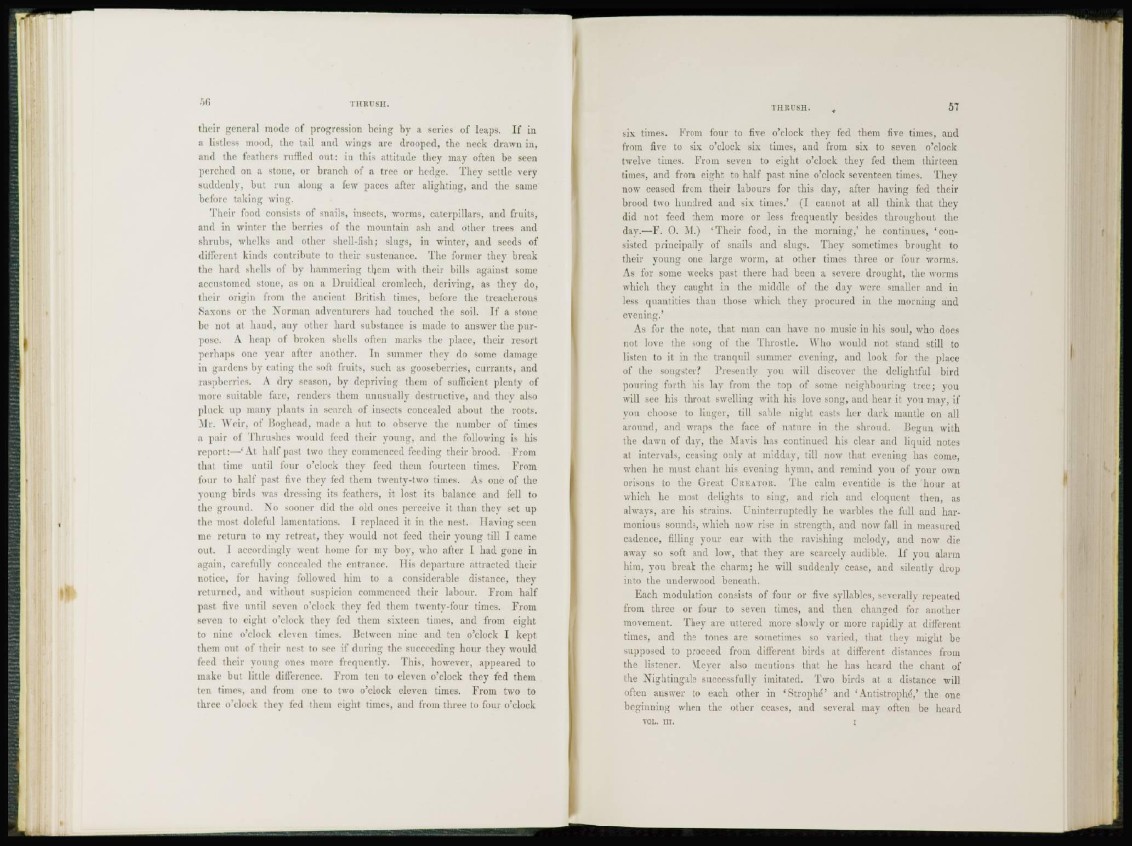
their general mode of progression being by a series of leaps. If in
a listless mood, the tail and wings are drooped, the neck drawn in,
and the feathers ruffled out: in this attitude they may often be seen
perched on a stone, or branch of a tree or hedge. They settle very
suddenly, but run along a few paces after alighting, and the same
before taking wing.
Their food consists of snails, insects, worms, caterpillars, and fruits,
and in winter the berries of the mountain ash and other trees and
shrubs, whelks and other shell-fish; slugs, in winter, and seeds of
different kinds contribute to their sustenance. The former they break
the hard shells of by hammering tljem with their bills against some
accustomed stone, as on a Druidical cromlech, deriving, as they do,
their origin from the ancient British times, before the treacherous
Saxons or the Norman adventurers had touched tin1 soil. If a stone
be not at hand, any other hard substance is made to answer the purpose.
A heap of broken shells often marks the place, their resort
perhaps one year after another. In summer they do some damage
in gardens by eating the soft fruits, such as gooseberries, currants, and
raspberries. A dry season, by depriving them of sufficient plenty of
more suitable fare, renders them unusually destructive, and they also
pluck up many plants in search of insects concealed about the roots.
Mr. Weir, of Boghead, made a hut to observe the number of times
a pair of Thrushes would feed their young, and the following is his
report:—'At half past two they commenced feeding their brood. From
that time until four o'clock they feed I hem fourteen times. From
four to half past five they fed them twenty-two times. As one of the
young birds was dressing its leathers, it lost its balance and fell to
the ground. No sooner did the old ones perceive it than they set up
t the most doleful lamentations. I replaced it in the nest. Having seen
me return to my retreat, they would not feed their young till I came
out. I accordingly went home for my bov, who after I had gone in
again, carefully concealed the entrance. His departure attracted their
notice, for having followed him to a considerable distance, they
returned, and without suspicion commenced their labour. From half
past five until seven o'clock they fed them twenty-four tunes. From
seven to eight o'clock they fed them sixteen times, and from eight
to nine o'clock eleven times. Between nine and fen o'clock I kept
them out id' their nest to see i f during the succeeding hour they would
feed their young ones more frequently. This, however, appeared to
make but little difference. From ten to eleven o'clock they fed them
ten times, and from one to two o'clock eleven times. From two to
three o'clock they fed them eight time-, and from three to four o'clock
six times. From four to five o'clock they fed them five times, and
from five to six o'clock six times, and from six to seven o'clock
twelve times. From seven to eight o'clock they fed them thirteen
times, and from eight to half past nine o'clock seventeen times. They
now ceased from their labours for this day, after having fed their
brood two hundred and six times.' (I cannot at all think that they
did not feed them more or less frequently besides throughout the
day.—F. O. M.) 'Their food, in the morning,' he continues, 'consisted
principally of snails and slugs. They sometimes brought to
their young one large worm, at other times three or four worms.
As for some weeks past there had been a severe drought, the worms
which they caught in the middle of the day were smaller and in
less quantities than those which they procured in the morning and
evening.'
As for the note, that man can have no music in his soul, who does
not love the song of the Throstle. Who would not stand still to
listen to it in the tranquil summer evening, and look for the place
of the songster? Presently you will discover the delightful bird
pouring forth his lav from the top of some neighbouring tree; you
will sec his throat swelling with his love song, and hear it you may, if
you choose to linger, till sable night casts her dark mantle on all
around, and wraps the face of nature in the shroud. Begun with
the dawn of day, the Mavis has continued his clear and liquid notes
at intervals, ceasing only at midday, till now that evening has come,
when he must chant his evening hymn, and remind you of your own
orisons to the Great CREATOR. The calm eventide is the hour at
which he most delights to sing, and rich and eloquent then, as
always, are his strains. Uninterruptedly he warbles the full and harmonious
sounds, which now rise in strength, and now fall in measured
cadence, filling your ear with the ravishing melody, and now die
away so soft and low, that they are scarcely audible. If you alarm
him, you break the charm; he will suddenly cease, and silently drop
into the underwood beneath.
Each modulation consists of four or five syllables, severally repeated
from three or four to seven times, and then changed for another
movement. They are uttered more slowly or more rapidly at different
times, and the tones are sometimes so varied, that they might be
supposed to proceed from different birds at different distances from
the listener. Meyer also mentions that he has heard the chant of
the Nightingale successfully imitated. Two birds at a distance will
often answer to each other in 'Strophe' and ' Antistrophe,' the one
beginning when the other ceases, and several may often be heard
VOL. III. I